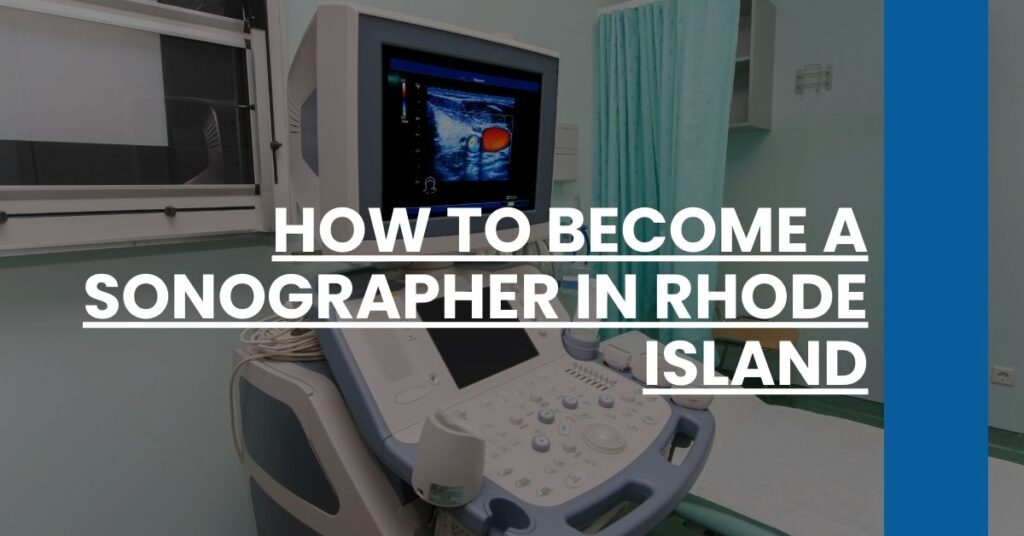Looking for programs in a specific city? Check out our lists of Sonography in Providence and Warwick.
Starting your journey on how to become a sonographer in Rhode Island? We’ve got you covered.
- Understanding Certification Requirements: Learn what you need to get certified.
- Finding Accredited Training Programs: Discover the right schools for your sonography education.
- Preparing for Certification Exams: Get tips on how to ace your sonography tests.
Set yourself up for success and know everything about how to become a sonographer in Rhode Island.
Certification: A Pathway to Professional Recognition
Registering Through ARDMS
Becoming a certified sonographer in Rhode Island through the American Registry for Diagnostic Medical Sonography (ARDMS) is essential. Certification demonstrates your skills and knowledge, making you a reliable asset in healthcare.
Steps to Certification
- Qualify for Examination: To sit for the ARDMS exams, you need to meet educational and clinical experience requirements.
- Pass the SPI Exam: The Sonography Principles and Instrumentation (SPI) exam covers the foundational physics of ultrasound.
- Specialty Exam: Select your specialty, such as abdominal, obstetric, or vascular sonography, and successfully pass the corresponding exam.
Importance of ARDMS Certification
Certification with ARDMS validates your expertise in sonographic techniques and principles. Employers often prefer or require certification, ensuring competent and quality care for patients.
Accredited Training Programs
Finding the right accredited training programs is a crucial step. Accreditation by the Commission on Accreditation of Allied Health Education Programs (CAAHEP) guarantees that the program adheres to the highest educational standards.
In Rhode Island, seek out accredited institutions offering robust sonography programs. These programs typically include a mix of classroom instruction and hands-on clinical experience, allowing you to apply theoretical knowledge in real-world settings.
Key aspects to consider when choosing a program:
- Length and Format: Programs can range from one-year certificate courses to associate’s and bachelor’s degrees.
- Curriculum: Ensure the curriculum covers both general and specialty sonography courses.
- Clinical Internships: Access to internships in medical facilities for practical experience.
Resources for Certification Preparation
Preparation is critical for passing certification exams. Utilize a variety of resources:
- Study Guides and Textbooks: Written exams often draw from standard sonography textbooks.
- Practice Exams: Simulate the test-taking experience to familiarize yourself with the format and timing.
- Review Courses: Enroll in review courses specifically designed for ARDMS exams. These courses often include comprehensive content reviews and practice questions.
Certification Renewal and Continuing Education
After obtaining certification, renewal is necessary to ensure continued competency. ARDMS requires sonographers to complete continuing medical education (CME) and submit proof regularly.
Maintaining your certification involves:
- Earning CMEs: Participate in workshops, seminars, and additional coursework to stay updated with the latest in sonography technology and practices.
- Renewal Fees: Pay the required fees as part of maintaining your certification status with ARDMS.
Staying current with educational advancements can open doors to higher-paying roles and expand your professional opportunities.
Now that you have a solid understanding of the pathway to certification and training, you can confidently embark on your journey to becoming a certified sonographer in Rhode Island. Remember, taking these crucial steps and utilizing available resources will position you for success in this rewarding healthcare career.
Looking for Sonographer Information On States Bordering Rhode Island?
In addition to Rhode Island, we suggest looking for schools in nearby states.
- How to Become A Sonographer in Massachusetts
- How to Become A Sonographer in Connecticut
- How to Become A Sonographer in New York
- How to Become A Sonographer in New Jersey
- How to Become A Sonographer in Delaware
Certification: A Pathway to Professional Recognition
Registering Through ARDMS
Becoming a certified sonographer in Rhode Island through the American Registry for Diagnostic Medical Sonography (ARDMS) is essential. Certification demonstrates your skills and knowledge, making you a reliable asset in healthcare.
Steps to Certification
- Qualify for Examination: To sit for the ARDMS exams, you need to meet educational and clinical experience requirements.
- Pass the SPI Exam: The Sonography Principles and Instrumentation (SPI) exam covers the foundational physics of ultrasound.
- Specialty Exam: Select your specialty, such as abdominal, obstetric, or vascular sonography, and successfully pass the corresponding exam.
Importance of ARDMS Certification
Certification with ARDMS validates your expertise in sonographic techniques and principles. Employers often prefer or require certification, ensuring competent and quality care for patients.
Accredited Training Programs
Finding the right accredited training programs is a crucial step. Accreditation by the Commission on Accreditation of Allied Health Education Programs (CAAHEP) guarantees that the program adheres to the highest educational standards.
In Rhode Island, seek out accredited institutions offering robust sonography programs. These programs typically include a mix of classroom instruction and hands-on clinical experience, allowing you to apply theoretical knowledge in real-world settings.
Key aspects to consider when choosing a program:
- Length and Format: Programs can range from one-year certificate courses to associate’s and bachelor’s degrees.
- Curriculum: Ensure the curriculum covers both general and specialty sonography courses.
- Clinical Internships: Access to internships in medical facilities for practical experience.
Resources for Certification Preparation
Preparation is critical for passing certification exams. Utilize a variety of resources:
- Study Guides and Textbooks: Written exams often draw from standard sonography textbooks.
- Practice Exams: Simulate the test-taking experience to familiarize yourself with the format and timing.
- Review Courses: Enroll in review courses specifically designed for ARDMS exams. These courses often include comprehensive content reviews and practice questions.
Certification Renewal and Continuing Education
After obtaining certification, renewal is necessary to ensure continued competency. ARDMS requires sonographers to complete continuing medical education (CME) and submit proof regularly.
Maintaining your certification involves:
- Earning CMEs: Participate in workshops, seminars, and additional coursework to stay updated with the latest in sonography technology and practices.
- Renewal Fees: Pay the required fees as part of maintaining your certification status with ARDMS.
Staying current with educational advancements can open doors to higher-paying roles and expand your professional opportunities.

